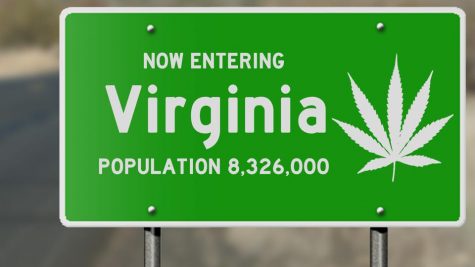Virginia to legalize marijuana, taking a progressive step in right direction
June 3, 2021
This July, Virginia plans on becoming the first southern state to legalize marijuana. But even with this legalization, there are strict laws surrounding it.
Ages 21 and above can possess up to an ounce of marijuana, but if caught with more than a pound, can face felony charges and a fine up to $250,000. First offenses can be charged with up to a $25 fine, second offenses require drug treatment, and a third offense would lead to a Class 4 misdemeanor. Selling the drug is still illegal, as is consuming it in public. Those under 21 who are caught with marijuana can face a $25 fine along with being placed in a substance abuse treatment and education program.
Anyone in possession of more than 50 plants can be charged with a felony. Under the legislation, people are only allowed to grow up to four plants. Retail sales won’t begin until 2024, so marijuana users must grow their own or have it gifted to them. If marijuana is found in an open container in a car, the driver will be charged with a DUI. An open container is defined as “any vessel containing marijuana except the originally sealed manufacturer’s container.” Since retail sales will not begin for another three years, technically any vessel would be considered an open container.

In the last two decades, D.C. and 33 other states have legalized marijuana for medicinal purposes. Marijuana has been used as a substitute for painkillers and drugs such as opiates, which can lead to drug addictions to drugs such as heroin. As a less risky pain killer, marijuana can decrease the rate of overdoses and opioid drug abuse.
Opponents to the legalization of marijuana claim it negatively impacts mental health, increases crime, and acts as a gateway drug. States that have legalized marijuana have not experienced much change, positively or negatively, to crime and suicide rates. Marijuana’s relationship with mental health is complex and dependent on multiple factors, such as alcohol use. As for acting as a gateway drug, marijuana is not very addictive, and a majority of marijuana users do not end up using “harder” substances.
The legalization of marijuana will also lead to a reduction in drug charges. High incarceration rates heavily impact communities, leading to mental health issues as well as creating a school to prison pipeline. In 2018, 663,367 arrests involved marijuana, and 92% of them were for possession. Marijuana also accounted for 36.8% of possession/use drug arrests.
For a drug with limited harmful effects, its impact on incarceration rates is extreme. With the legalization of marijuana, the rates of unnecessary imprisonment will decline.
Overall, the legalization of marijuana, even with all of the laws surrounding it, is a step in a positive direction.


